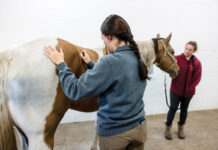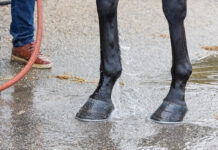
The threat of deadly equine diseases like West Nile and rabies is closer than you think. Don’t leave your horse exposed. Help protect him with annual vaccinations against the five core equine diseases:
Eastern and Western Equine Encephalomyelitis
Rabies
This equine neurologic disease is caused by a virus in the saliva of infected animals, usually transmitted through a bite. Once inside the horse, the rabies virus travels up the nerves to the brain, where the disease progresses rapidly and is always fatal. As a zoonotic disease, rabies presents a risk of disease transmission to humans. Annual core vaccination is critical to help protect horses and those who care for them.
Tetanus
All horses are at risk for developing tetanus, a potentially fatal bacterial disease caused by Clostridium tetani. Present in the intestinal tract and feces of horses, other animals and humans, the bacteria can be abundant in the soil. Bacterial spores can survive in the environment for years, creating a constant risk for horses and people.
West Nile
The West Nile virus causes inflammation of the central nervous system. Transmitted by mosquitoes — which feed on infected birds — horses are at the highest risk for contracting West Nile virus during peak mosquito season, which occurs July through October in the United States.1 Because the virus has been identified in the entire continental United States, as well as Mexico and Canada, all horses are considered at risk.
Horses are continually exposed to wildlife and mosquitoes that transmit core equine diseases. Core vaccinations are recommended for all horses because the diseases are prevalent; highly infectious; have the potential to cause serious disease or death; pose a threat to human health; or are required by law. The core vaccination guidelines were created by the American Association of Equine Practitioners, the leading group of equine veterinarians, and are recommend annually as part of overall equine wellness.
Annual core vaccinations help provide protection through immunologic memory, the body’s immune response against an infectious pathogen, which allows the horse’s body to react more quickly after the immune system has been primed with an initial series of vaccines. Vaccines produce immunologic memory; however, circulating vaccine-specific antibodies and immune cells in horses can drop in concentration after a few months. Annual boosters help keep these numbers steady.
Core disease vaccination is the foundation for equine wellness. Be sure to talk with your veterinarian about risk-based vaccinations, deworming and dental care for the total wellness every horse deserves.






